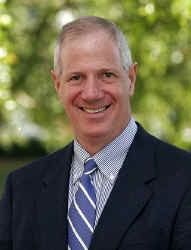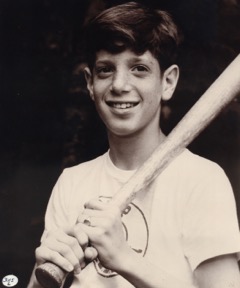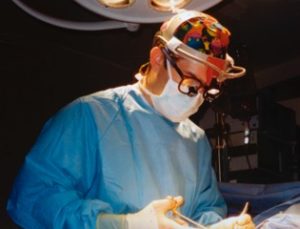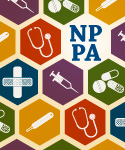June 20th, 2017
Mending Broken Hearts: A Profile of a Heart Surgeon
Alexandra Godfrey, BSc PT, MS PA-C
“Resilience makes space for feelings. It’s different from depersonalization—something that we see in medicine today. The depersonalized response to tragedy is ‘too bad, so sad, get on with it.’ Depersonalized physicians believe feelings are too risky and painful, so they can’t imagine that feelings exist in others.”—Ross Ungerleider, MD
 Ross Ungerleider, pediatric cardiothoracic surgeon at Driscoll Children’s Hospital in Corpus Christi, Texas, is ranked in the top one percent of his specialty and has for the past twelve years been listed as one of America’s best doctors. Over the course of his 40-year career, he has repaired the hearts of more than 6,000 children.
Ross Ungerleider, pediatric cardiothoracic surgeon at Driscoll Children’s Hospital in Corpus Christi, Texas, is ranked in the top one percent of his specialty and has for the past twelve years been listed as one of America’s best doctors. Over the course of his 40-year career, he has repaired the hearts of more than 6,000 children.
Ungerleider’s office is a shrine to children with congenital heart defects. Children’s cards and paintings cover the walls, leaving his awards stacked along the baseboards. Textbooks he’s written sit beside a model heart, and a box filled with artificial valves occupies the coffee table.
I ask, “How many heart surgeries are too many?”
He looks me in the eye. “Every single one.”
Ungerleider’s journey began when his mother took him as a child to the Chicago Roosevelt Museum (now the Museum of Science and Industry). There he saw an enormous model of the human heart with patches and valves lowered into it on strings like a complicated marionette.
His fascination was not just scientific. His parents were divorcing, and he was trying to understand the collapse of his family.
“I was amazed by how orderly and precise it all looked,” he says.
For ten-year-old Ross, the model made sense of broken hearts.
Years later, the summer before he left for college at Wesleyan University, his stepfather was killed in a tragic accident. “A divorce is devastating,” he says. “It makes it harder to relate to the people you love because they’re not in the same place and may say awful things about each other. But they’re still there. I understand the permanence of death. I never take lightly the fear of the parents of the children I operate on.”
On the day that his mother drove him to college, they heard a song on the radio — Tony Bennett’s hauntingly beautiful “Who Can I Turn To?” His mother looked into his grieving eyes and said, “I’ll find that record and send it to you.”
On a crisp New England morning a month into his undergraduate studies, he received a call telling him that his mother had unexpectedly died. Stunned and numb, he went home for the funeral. When he returned to campus, “I was walking across the football field, looking at the stars and wondering, what would become of me? How was I going to make it? “
The next morning, he received a package in the mail — “Who Can I Turn To?” Mailing that record had been one of the last things his mother ever did.
Ungerleider now believes that his mother died of Broken Heart Syndrome. Shortly after her death, his English professor read out loud an excerpt from the Yeats poem, “The Circus Animals’ Desertion.” As he read, “I must lie down…in the foul rag and bone shop of the heart,” the professor went to the window, raised it to take a deep breath, and said, “You are all too young to understand.”
But Ungerleider understood.
He graduated from Wesleyan University with a major in English, a thesis in biology, and highest honors. It was 1970. The Vietnam War was raging, and the draft caused a surge in applications to medical school, making admissions far more competitive. Like his peers, he was afraid that his dreams would be shattered. He watched a friend throw a chair at the television when his number was called.
Ungerleider was accepted into medical school on his third attempt, landing at Rush University in Chicago. After medical school, he went into the CT surgery training program at Duke, helping start Duke’s pediatric heart program in 1986. He spent 23 years at Duke, first as a resident and later as faculty. He subsequently worked in Oregon, Ohio, North Carolina, and finally Texas. Through hard work, determination, and trial and error, he became an expert in heart defects with special expertise in aortic valve surgery.
Ungerleider believes that his parents’ divorce, followed by the loss of his stepfather and then his mother while he was still so young, gave him the resilience to withstand failure and the empathy needed to care for patients — probably two of the most important skills needed in medicine today.
As a child in Chicago, Ungerleider had been mesmerized by the soft, incessant “lub, dub,” of the model heart in the museum. And looking back now, he recognizes that the exhibit highlighted major breakthroughs in the management of congenital heart defects. Heart-lung bypass had just become a reality.
But at the time, “I only knew that, if I became one of these surgeons,” he says, “I could fix the broken hearts of other kids.”






What a wonderful tribute to a remarkable man. The seeds for future passions get sown quiet early.
Amazing story as I struggle through not a child having heart surgery but my beloved mother whose routine heart surgery had become complicated and I am struggling to keep my faith.
Thank you Heather. I will be thinking of you and your mother. .
To reveal the true character of another person, whether great or unknown, is a tremendous skill. Adding the pictures enriched the piece as well. I love the upfront quote from him. Thank you.
Thank you David. I felt great responsibility when writing this. I am glad you appreciated it. He’s an example of an extraordinary doctor.
Dr. Ungerleider saved my 3 month old daughter when he operated on her in Cleveland, Ohio on November 10, 2009. He is truly an angel on Earth. His bedside manner and empathy for parents is beyond extraordinary. I am so thankful he was in Cleveland when he was. Thank you for writing such an amazing article on such a wonderful man.